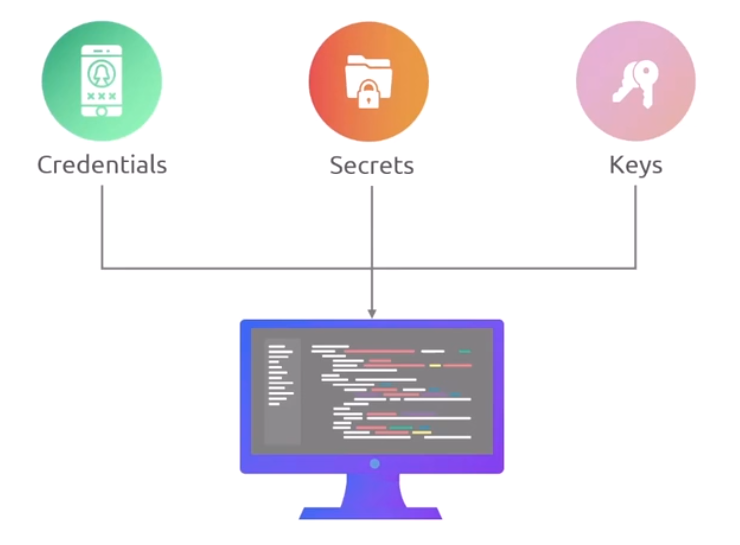Environment Variables
Environment Variables
Environment variables in Jenkins provide dynamic data for builds, storing essential configuration details that can be reused across jobs.
- Can store values like paths, build information, and system configurations
- Make scripts flexible by avoiding hardcoding of values
- Allow customized environments for specific job requirements

Variables in Jenkins
Jenkins supports both system and job-specific environment variables, making it adaptable to a wide range of needs.
- Useful for sharing data between stages and scripts
- Simplify maintenance by centralizing frequently used settings
There are two types of environment variables in Jenkins:
-
System environment variables
- Include operating system and Java-based variables available to all jobs
- Defined by the OS or Java runtime, accessible across Jenkins
-
Jenkins-specific variables
- Defined by Jenkins to provide job-specific information
- Includes variables like
BUILD_NUMBER,JOB_NAME, and more
Defining Variables
Variables can be defined globally, within a job, or in a pipeline script to meet different scopes and needs.
-
Globally
- Accessible across all jobs, set in Jenkins configuration
- Ideal for variables used by multiple projects or jobs
-
Within a Job
- Defined directly in job configurations, accessible only to that job
- Useful for job-specific settings or one-time builds
-
In a Pipeline Script
- Defined within a script to be used in specific pipeline stages
- Enables dynamic and conditional variable handling
Global Variables
Environment variables can be set directly in the Jenkinsfile to be used across stages in the pipeline.
pipeline {
agent any
environment {
SAMPLE_VAR = "Hello, Jenkins!"
}
stages {
stage('Print Variable') {
steps {
echo "The value of SAMPLE_VAR is: ${env.SAMPLE_VAR}"
}
}
}
}
This example sets an environment variable SAMPLE_VAR and then echoes its value in the "Print Variable" stage.
Variables in Build Stages
In Jenkins, environment variables defined within a specific stage are not automatically accessible in subsequent stages of the pipeline. In the example below, the Test stage will fail because it will not be able to find the IP_ADDRESS and PORT variables.
pipeline {
agent any
stages {
stage('Build') {
environment {
PORT = "8080"
IP_ADDRESS = "192.168.1.1"
}
steps {
echo "Build stage is using IP: ${IP_ADDRESS} on PORT: ${PORT}"
}
}
stage('Test') {
steps {
echo "Test stage accessing IP: ${IP_ADDRESS} on PORT: ${PORT}"
}
}
}
}
When you run the build using the Jenkinsfile above, you may encounter an error in the Console Output like this:
Also: org.jenkinsci.plugins.workflow.steps.FlowInterruptedException:
java.lang.IllegalArgumentException:
No such property: IP_ADDRESS for class: groovy.lang.Binding
Possible solutions: IP_ADDRESS, P
...
Caused by: groovy.lang.MissingPropertyException: No such property: PORT for class: groovy.lang.Binding
To use variables across multiple stages, they need to be defined globally at the pipeline level.
pipeline {
agent any
environment {
PORT = "8080"
IP_ADDRESS = "192.168.1.1"
}
stages {
stage('Build') {
steps {
echo "Build stage is using IP: ${IP_ADDRESS} on PORT: ${PORT}"
}
}
stage('Test') {
steps {
echo "Test stage accessing IP: ${IP_ADDRESS} on PORT: ${PORT}"
}
}
}
}
Built-in Environment Variables
Jenkins provides several built-in environment variables that allows users to reference specific job and build details directly within the scripts and pipeline stages.
| Variable | Purpose | Example |
|---|---|---|
BUILD_ID | Unique identifier for the build | 123 |
BUILD_NUMBER | Build number assigned by Jenkins | 45 |
JOB_NAME | Name of the job being run | MyPipelineJob |
WORKSPACE | Path to the job workspace | /var/lib/jenkins/workspace |
JENKINS_HOME | Jenkins home directory path | /var/lib/jenkins |
BUILD_URL | URL of the build in Jenkins | http://jenkins/job/45/ |
GIT_COMMIT | Commit hash of the Git revision | a1b2c3d4e5f6 |
NODE_NAME | Name of the node running the build | master or agent1 |
Below is an example of a simple Jenkinsfile that accesses these environment variables during the build process:
pipeline {
agent any
stages {
stage('Build') {
steps {
script {
// Accessing built-in environment variables
echo "Building ${JOB_NAME} (Build #${BUILD_NUMBER})"
echo "Workspace: ${WORKSPACE}"
echo "Build URL: ${BUILD_URL}"
echo "Current Git Commit: ${GIT_COMMIT}"
echo "Running on Node: ${NODE_NAME}"
}
}
}
stage('Test') {
steps {
script {
// Running tests
echo "Running tests for ${JOB_NAME} (Build ID: ${BUILD_ID})"
// Add test commands here
}
}
}
stage('Deploy') {
steps {
script {
// Deployment logic
echo "Deploying build #${BUILD_NUMBER} to production..."
// Add deployment commands here
}
}
}
}
}
Best Practices
When working with environment variables in Jenkins, following best practices can enhance security, consistency, and maintainability.
-
Keep them secure
Use Jenkins credentials for sensitive data and restrict access to authorized users. -
Keep them consistent across projects
Standardize naming conventions for easier understanding and maintenance. -
Maintain documentation of the variables
Document variables, their purposes, and expected values for quick reference and onboarding.